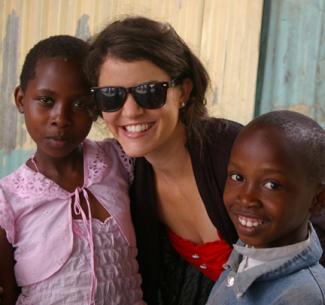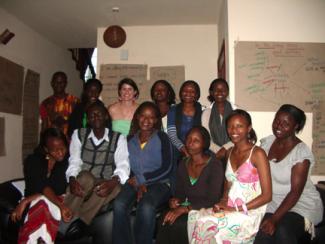Texas native Natalie Finstad was a Life Together intern in 2009 and 2010, designing the inaugural 9/11 remembrance and service day in the diocese while also organizing volunteers to get an Allston rectory ready to house fellow interns—all before taking up her official internship placements for the year at the Trinity Boston Foundation and The Crossing, the emergent worship community at the Cathedral Church of St. Paul.
She’s now living in Nairobi and has started Be the Change Kenya, through which she’s aiming her organizational skills, together with others, at nothing less than ending child poverty.
Natalie returns to Massachusetts for a spring visit and invites anyone interested in learning more about Be the Change Kenya to join her for conversation at St. James’s Church in Cambridge on April 3, after the 10:30 a.m. service, and at St. Mark’s Church in Burlington on May 1 at the 9 a.m. service. Contact her at director.btcke@gmail.com to learn more or to arrange additional speaking events.
An interview with Natalie follows.
When you packed up your Life Together suitcase, so to speak, what did you carry with you from here to there? Wow. I learned so much there. The power of community, both in the living community and in work. I saw over and over again that when people came together around common passions to enact the Gospel, miraculous things happen. I have repeatedly come back to that in Kenya when working with a population quite different than myself. Despite the cultural differences, when we come together and stay focused on our mission, amazing things happen.
We had to learn and relearn to stay focused on our common hope—to live together in Christ. Keeping us focused on the reward of loving one another—even though the rubbing against one another and pain of togetherness has been hard. I look back to the time with Life Together as a reminder that it’s worth it in the end.
Most importantly, I learned the value of doing what you are called to do. I constantly encourage the young adult team members and the leaders of our partner organizations to do what makes them feel alive. I think I always “knew” that but now I know that.
Tell us about Be the Change Kenya, it’s mission and projects. Be the Change Kenya developed out of my experience volunteering as a teacher at a small local orphanage. Almost daily the manager of the home would come to me and ask for help with funds to buy lunch or pay salaries. I had made a decision that I didn’t want to be seen as a pocketbook so, painfully, I kept saying no.
After about a month there I could see some of the core issues. The home was supported on the shoulders of one or two large donors, and when they pulled out of the project, the structure crumbled. Be the Change Kenya was formed as an answer to this problem. We train local young adults in community organizing skills and then match them with local orphanages. Those teams work with the organization to recruit local support in the form of grants, in-kind donations, corporate sponsors, individual donors.
In addition, a team of local advisors works with the board and leadership at our partner homes to tighten up their infrastructure and help them become more accountable to their donors.
The first project we took on was the leadership training. I had 17 Kenyan young adults in our apartment practicing public narrative and planning strategy for a successful campaign. It was a rush! Out of those participants, a group of 11 of us formed a partnership with Christ Chapel Children’s Home, an orphanage located 40 minutes outside of Nairobi in the slums. We spent about five months working with them, and in that time, we raised support to fund the everyday expenses at the home—meals, salaries, medicine, etc.—organized two community involvement days, trained 30 mentors for duty and recruited loads of clothes and goods for the home.
The partnership ended in March and we’re currently traveling around Nairobi interviewing different homes to be our next potential partner. The catch is that we need to raise a bit of capital before we can continue this essential work. That’s why I’m coming home this spring. If I can raise the needed funds, we’re hoping to expand and start work with two homes in August.
What are your observations about how to get from a mission statement to actual mission? This is a hard question to answer because my gut says: Just go for it. Yet I know that “going for it” can be complicated.
When I started Be the Change Kenya, I researched qualities for starting a successful organization. One of the best pieces of advice I read said: Successful organizations don’t spend their time wordsmithing their mission, they practice it. I would encourage organizations, parishes, communities to think of their work as practice. We will never get to perfection or fix all the ailments of the world, but if we don’t practice, we’ll remain people behind computers or in pews.
I think the first step is to find people who want to do this with you: share your vision, refine it through discussion, make a plan and then act on it. I can almost promise you that at some point you’ll have to look back at your original mission statement and modify it to fit your experience, but don’t let that hinder you from acting.
One more thing: I know sometimes I get caught up in the “I’m not ready’s.” While we certainly need to be prudent, I want to encourage us to act, knowing that action brings resources. People come when things are being done, resources flow to active programs, members join active churches. God calls us to be bold—let’s do it.
How does your religious faith help, and how is it challenged by the current context in which you’re working? I couldn’t be here without my faith. It’s as simple as that. Kenya is an incredible place and the work I’m a part of is amazing, but it’s hard.
I believe that God has called us each into this world to be a part of its reconciliation. I also believe that I have a specific role to play in that reconciliation, and, today, I believe my role is here. There have been many times when I’ve said, how am I going to do this? And God has been the quiet voice in the other ear saying, this is where I’ve called you, it will get done. Faith gives me a vision of a world reconciled, standing together.
I think the biggest challenge has been keeping the vision in front of me despite setbacks or stumbles, but then again, isn’t that all of our challenge?
What is it like living in Nairobi? Do you have a favorite discovery there so far? I think we need a separate interview just for that! I love Nairobi. The weather is amazing—it’s about 80 degrees always. The food here, fantastic, and I have found a small but sweet community of one or two friends to spend time with on occasion. My favorite discovery is the rediscovery of produce. I can buy a huge bushel of fresh veggies for about two U.S. dollars. I will miss this to no end when I return home!
The perennial advice question: What one thing, or first step, can any one of us undertake to “be the change” in some way in our daily lives, no matter where we live or work? No more excuses. We won’t change the world single-handedly, but if we all play our part and work together, can you imagine what would happen? What is that voice calling you to? Is it to get up five minutes earlier so you can buy a coffee for someone on the streets? To write an e-mail of encouragement? Donate to a worthy cause? Reconcile with a family member? Speak up about injustice at work? Share a hug? Please don’t think your part is too small; it’s essential. Effective change boils down to us all responding to that voice and doing our part, one action at a time. No excuses.


